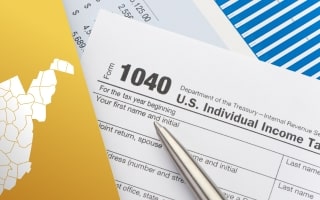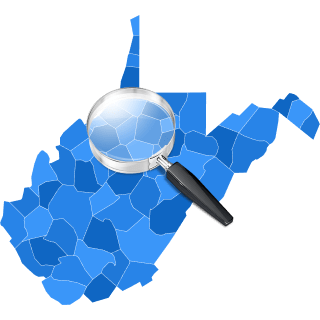Property Tax Records in West Virginia

When West Virginia became a state in 1863, it adopted a property tax. While many homeowners and government officials have criticized this tax, it has never been eliminated.
However, the state made some significant changes to property taxes during the Great Depression. In 1932, property was reclassified into four distinct categories, which resulted in homeowners and farmers benefiting from reduced tax burdens. In comparison, businesses had to pay higher taxes.
When you purchase a home in West Virginia, you'll pay property taxes every year. These taxes are mainly based on the value of your home. You can calculate them by knowing your county's effective tax rate.
West Virginia's average property tax rate is just 0.55%, among the lowest in the country. In comparison, the national average is just under 1%. Of the 55 counties in West Virginia, not one has a tax rate of 1% or higher.
During the year, you'll receive two tax bills that you'll need to pay by September 1 and March 1. If you make these payments before they are due, you'll benefit from a 2.5% discount for each installment. Late payments come with an annual interest rate of 9%. The amount of taxes you end up paying is calculated once the assessor in your county determines the market value of your home. Unless you qualify for a West Virginia property tax exemption, a high property value often means elevated taxes.
Property Tax Assessment in West Virginia

West Virginia property taxes are based on the tax rate in your county and the assessed value of your property. The local assessor will calculate the assessed value of your home once they identify its true market value, which is the price that it will currently sell at. State law requires county assessors to reappraise homes once every three years, which involves visiting the properties directly.
In West Virginia, a home's assessed value is around 60% of its appraised value. If your home has a market value of $220,000, its assessed value will be $132,000. The property tax rate will be applied to this amount. While your home is only reappraised every three years, the assessed value will be updated annually. These updates are made with the latest market data. If the value of your home increases by over 10% or $1,000 in a year, you'll receive a notification in the mail.
While your county applies a tax rate to your home's assessed value, the cities and school districts within your county levy their own taxes. The total rate is the sum of all individual rates. These rates are expressed as cents for every $100 in assessed value. If your home has an assessed value of $132,000 and a tax rate of 70, you can start calculating your taxes by dividing the assessed value by 100. You must then multiply the amount by the rate of 0.70. You'll end up paying $924 in annual taxes.
You can also estimate your West Virginia property taxes by multiplying the market value of your home by your county's effective tax rate. Jackson County has an effective tax rate of 0.59%. If you multiply this percentage by the market value of $220,000, your property taxes will be $1,298 per year. The tax rates for the most populous West Virginia counties are:
- Kanawha County: 0.77%
- Berkeley County: 0.70%
- Monongalia County: 0.57%
- Cabell County: 0.68%
- Wood County: 0.70%
Kanawha County property taxes are the highest in the state. This makes sense since it's home to Charleston, the most populated city in West Virginia. However, no matter where you buy a home in West Virginia, your property taxes aren't going to be high when compared to homes in nearby states.
Calculate West Virginia Taxes
Using a West Virginia property tax calculator is a smart way to gain a clearer understanding of how property taxes are determined throughout the state. This tool allows both homeowners and real estate investors to enter key property details, such as location, assessed value, and property classification, to estimate their annual tax assessment and liability. In West Virginia, properties are typically assessed at 60% of their appraised value, with tax rates set by counties, municipalities, and local school districts, meaning your final bill will vary based on where the property is located.
A West Virginia property tax calculator also helps identify exemptions and tax relief programs that may lower your tax burden. Eligible homeowners can benefit from the Homestead Exemption, which reduces the assessed value of a primary residence by $20,000 for residents aged 65 or older, or those who are permanently and totally disabled. The calculator can be a useful tool for estimating how much you might save and for planning your annual tax obligations more effectively based on your specific circumstances.
using our property tax calculator.
West Virginia Property Tax Records: What Are They?

West Virginia property taxes are collected by county governments and used to pay for some of the expenses in their annual budgets. When you make your biannual payments, the money will be used by your local governments to fund infrastructure projects, public services, and local schools.
If you're interested in purchasing a West Virginia home to use as your primary residence or a rental property, you should do some research before making an offer. You can learn more about this home by looking up West Virginia property tax records. These records include publicly available information, such as the year the home was built and the amount of taxes the owner paid.
With these records, you'll be more knowledgeable about any property you make an offer to buy. You can find these records on the state's assessment website. It provides access to real estate records in all 55 West Virginia counties. The information you'll receive in these reports includes the details below:
-
Parcel ID
-
Tax year
-
Structure drawing
-
Owner name
-
Property address
-
Acreage
-
Appraised and assessed values
-
Year built
-
Architectural style
-
Extensive sales history
-
Valuations from previous tax years
-
Tax records
-
Flood zone information
-
Map
Property Tax Exemptions and Deductions in West Virginia

When you buy a home in West Virginia, you may be able to reduce your annual tax bill. West Virginia offers several tax exemptions and deductions that can effectively reduce the assessed value of your home. A decrease in your home's assessed value will automatically reduce your tax bill. When you're researching tax exemptions, look for any deadlines that you need to meet. Here are a couple of the exemptions you might qualify for.
Homestead Exemption: If you qualify for this exemption, you will be able to reduce your home's assessed value by $20,000. It can only be used with primary residences. Make sure you apply for the exemption between July 1 and December 1. The application should be filed with your local assessor's office. Property owners will need to be at least 65 years old to qualify. Before claiming the exemption, you need to be a resident of the state for two consecutive years.
Disabled Exemption: This exemption reduces your home's assessed value by $20,000, which matches the homestead tax break. The main difference is that there isn't an age restriction. To qualify, you must show proof that you have a total and permanent disability. You can obtain the necessary documentation from the Department of Veterans Affairs or the Social Security Administration. Keep in mind that you'll need to own and live in the home for at least two years if you wish to qualify.
How To Search Property Tax Records in West Virginia

There are numerous methods you can use to find property tax records in West Virginia. While the county and state governments offer several resources that property owners can take advantage of, most records are available through mapwv.gov.
When you use this database, you can search for the records of a specific property by entering the owner's name, street name, map number, parcel ID, and tax class. Once you input the street name, you'll receive a list of properties. Clicking on a property will take you to a report that offers comprehensive assessment data. You may be able to find some tax records on the auditor's or sheriff's website in your county as well.
These records are also easy to access via a third-party solution like PropertyChecker. This website allows you to search for deed records and data by entering the property address, owner's name, or parcel ID. Once you search, you'll receive the following information:
-
Property owner names
-
Deed records
-
Loan records
-
Previous sales history
-
Lien records
-
Building permits
-
Foreclosure data
-
Current and past property values
-
Relevant property details, such as the condition of the home and the number of bedrooms
-
Property tax records
-
Neighborhood information
How To Appeal Property Taxes in West Virginia

In West Virginia, county assessors are required to reassess homes at least once every three years. If the fair market value of your home increases or decreases, you'll receive a notice that your home's assessed value has changed.
Once you get this notice in the mail, check the current market value and assessed value to determine if a mistake has been made. West Virginia allows homeowners to appeal assessment notices, which can be done by adhering to the following steps:
Step 1: To start this process, file an informal appeal with your local assessor. If you believe that they have improperly valued your property, you'll have eight business days to appeal. No further steps are needed if the assessor agrees to alter the valuation.
Step 2: If the assessor doesn't agree with your appeal, you can file another one with the County Board of Equalization and Review. Your hearing will likely take place in February, which is when the Board typically hears appeals. During this hearing, you can present your evidence.
Step 3: If you want to bypass the Board of Equalization and Review, you can appeal to the Board of Assessment Appeals. They hold hearings in October. However, your written appeal must be submitted by February 20. You'll also need to pay your taxes on time to have your appeal heard. If you don't submit your appeal on time, you must wait until the next tax year.
How Property Tax Records Impact Real Estate Transactions in West Virginia

When you purchase, sell, or invest in a West Virginia home, there are many factors that you'll want to consider before the transaction closes. For example, a buyer might be tasked with estimating how much they'll spend each month after taking out a loan to purchase a property.
Depending on the value of the home, property taxes can amount to several thousand dollars. Most homeowners pay their property taxes with their monthly mortgage payments. Buying a home in a county with a high property tax rate can cause mortgage payments to spike, which is why a buyer may need incentives before closing on a home. The types of incentives that a seller can provide to a buyer include everything from performing a few important repairs to paying for the closing costs.
Since most counties in the state have reasonable property tax rates, these taxes aren't often a major sticking point during West Virginia real estate transactions. However, investors still need to consider them when weighing the viability of a rental. To earn profit on a rental investment, the investor must bring in more money every month than they spend, which means charging a rental rate that's higher than their debt payments. It's easier for investors to earn profits by purchasing properties in counties with lower tax rates.
Investors in West Virginia can also acquire properties in tax sales hosted by the counties. Before 2022, this type of sale was handled by the local sheriff's office. These sales are now held by the auditor's office. West Virginia is a tax lien state, which means that two types of sales that can occur.
The first sale takes place when a homeowner doesn't pay their property taxes on time. As mentioned previously, these taxes are due in multiple installments that must be paid by September 1 and March 1. First-half taxes that remain unpaid become delinquent on October 1. As for second-half taxes, they become delinquent on April 1.
Once taxes become delinquent, the local government can place a tax lien on the property in question. If the existing homeowner attempts to sell the property, the county will collect the taxes they are owed from the proceeds. The county may also choose to sell the tax lien to investors in a public auction. The winning bidder will be able to collect interest but can't claim the property.
If taxes remain delinquent for around three years, the property can be sold in a tax sale or claimed by the holder of the lien certificate. If the existing homeowner repays their taxes and the accumulated interest before the date of the sale, they can reclaim the property for good.
Free West Virginia Property Tax Lookup
Tax Records Please wait...
Property Tax Guide
- Property Tax Records in West Virginia
- Property Tax Assessment in West Virginia
- West Virginia Property Tax Records: What Are They?
- Property Tax Exemptions and Deductions in West Virginia
- How To Search Property Tax Records in West Virginia
- How To Appeal Property Taxes in West Virginia
- How Property Tax Records Impact Real Estate Transactions in West Virginia
Instant Access to West Virginia Property Records
- Owner(s)
- Deed Records
- Loans & Liens
- Values
- Taxes
- Building Permits
- Purchase History
- Property Details
- And More!
Free West Virginia Property Tax Lookup
Tax Records Please wait...
Property Tax Guide
- Property Tax Records in West Virginia
- Property Tax Assessment in West Virginia
- West Virginia Property Tax Records: What Are They?
- Property Tax Exemptions and Deductions in West Virginia
- How To Search Property Tax Records in West Virginia
- How To Appeal Property Taxes in West Virginia
- How Property Tax Records Impact Real Estate Transactions in West Virginia